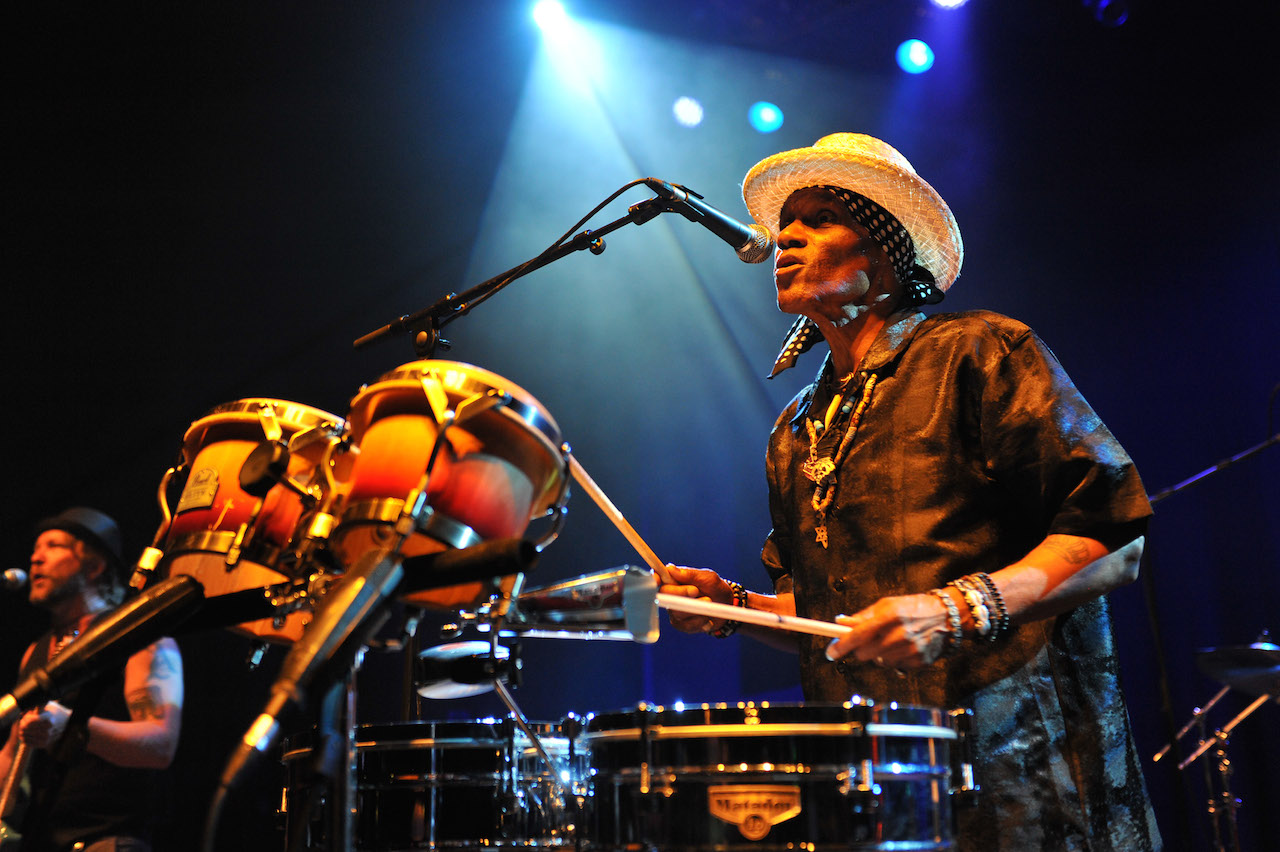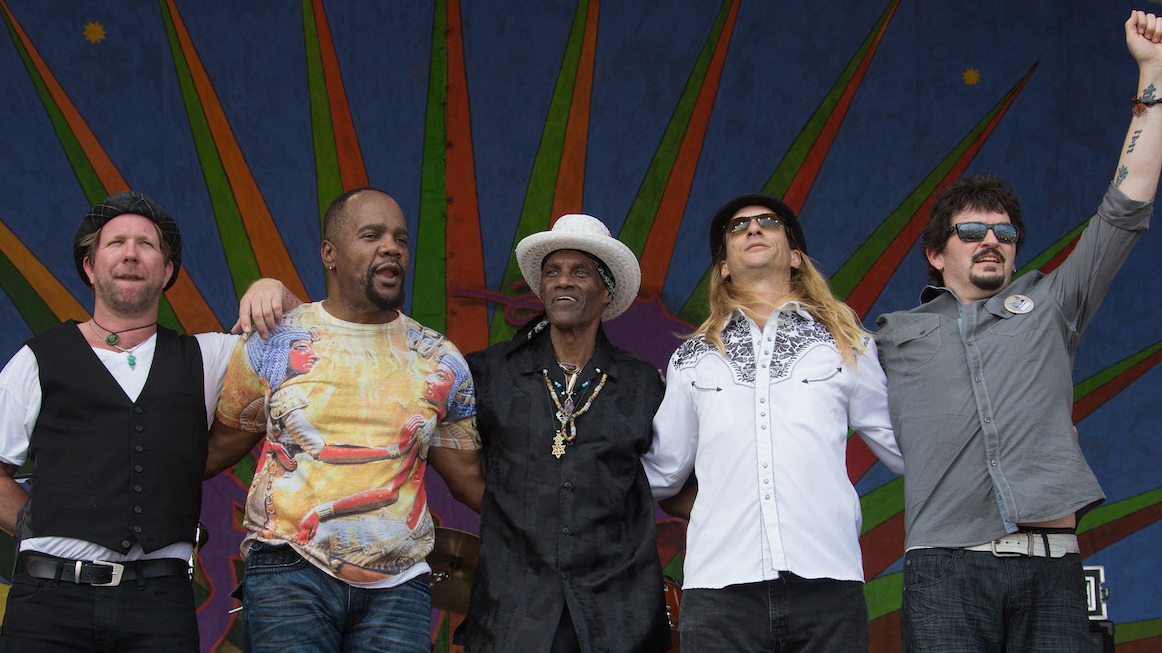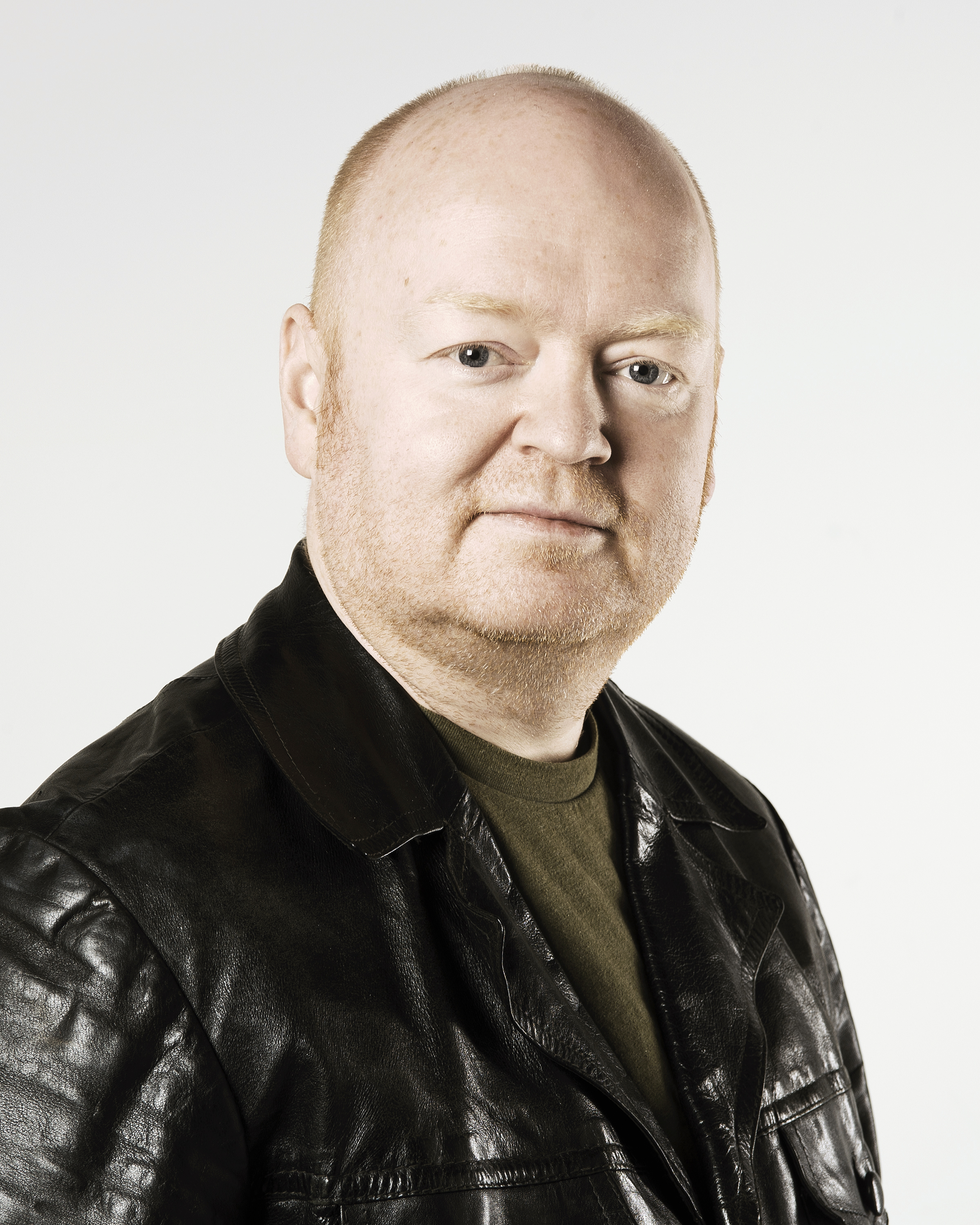This article first appeared in Issue 1 of The Blues, June 2012
In New Orleans, gumbo isn’t just an entrée; it’s a philosophy for life. Just like the legendary Louisiana stew, disparate elements blend together effortlessly on the streets of ‘New Awlins’. Tourists, prostitutes, students and lunatics crowd the sidewalks of the city’s French Quarter. The air is thick with the smell of Cajun, Creole, BBQ and Mexican cuisine. Blues, funk, soul, country and ska music spills out of the countless local bars and dives. It’s a melting pot; a smorgasbord if you will.
It’s in the French Quarter, at The House Of Blues, that we meet a new Southern supergroup that defines the term ‘musical gumbo’. In a real gumbo the Cajun Holy Trinity is chopped onions, celery and bell peppers. In the Royal Southern Brotherhood, it’s blues, soul and rock. RSB is blues guitarist Mike Zito, Neville Brother and ex-Meters percussionist Cyril Neville, guitarist Devon Allman (son of Allman Brother Gregg), ex-Derek Trucks Band drummer Yonrico Scott and bassist Charlie Wooten.
The thinking behind the Royal part of the band’s name is clear when you take into account the legacy of the Neville and Allman surnames. Two great Southern brands have been joined at last. Like any good gumbo, the success of Royal Southern Brotherhood is down to choosing ingredients that complement each other, then letting them simmer until the magic happens.
It was all Rueben Williams’ doing. “What would it be like to have an Allman Brother and a Neville Brother in the same band?” the mover and shaker on the Louisiana music scene, and RSB’s manager, pondered with Mike Zito one day. “How come no one’s ever tried to put them together?”
“We should try that,” replied Zito, and the blue touch paper began to smoulder. Until then the five cats that now make up the Royal Southern Brotherhood were happily going about their business. No one was looking for a new gig; none of these guys were out of work.
As it happens, Zito had already scored a 2009 Blues Music award with Pearl River, a song co-written with Cyril Neville. The two men had never met before. “That was the first time I’d written a song with anybody,” says Mike. “He sent me some lyrics and said, ‘Check these out. See what you think.’ That’s what started our friendship; winning an award.”
Mike and Devon Allman go way back. “We knew each other in St. Louis,” he comments. “We worked in a music store together. After that we stayed in touch over the years. We’d be touring and see each other on the road.”
The three men started talking, and soon Rueben’s dream of a Neville and Allman in the same line-up became a reality. All that was missing was a great rhythm section. When Zito, Neville and Allman found out that Yonrico Scott was available they jumped at the chance to lure him into the line-up. As it turned out, the drummer was just as excited by the prospect of playing in a band with a Neville and Allman as Zito was. Yonrico was in. Respected bassist Charlie Wooten – who was absent during our interview – completed the group. “From the original idea to the conception it was almost a year and a half,” says Mike.
“We’d been doing telephone calls, emails, texts; putting song ideas together,” says Cyril. “We were getting to know each other.”
The shit got real when the guys finally met, as a band, in a room in Louisiana. “It was a match made in heaven from the first note,” recalls Yonrico. “The first time we played together in the studio we just knew. It just came together. It felt right. The vibe was right.”

Royal Southern Brotherhood recorded their self-titled debut at Dockside Studio in Maurice, Louisiana. “BB King, Gatemouth Brown… everybody that’s somebody has recorded there,” says Yonrico of the studio that’s located on a 12-acre estate. Dr. John, Junior Wells, Johnny Sansone and Derek Trucks have also recorded there.
Yonrico is right about the chemistry. The record came together so fast the band barely had time to unpack their suitcases. “Five days,” he states proudly. “The whole thing.”
“Yeah, 12 tracks in two days and the record was finished in five,” adds Cyril who realised something special was happening from the moment he set foot inside the studio. “I got to the session at about 10 o’clock the morning after these guys got there,” he says. “The drummer and the guitar player were there. When I walked in they had already recorded two tracks.”
“And they were good…” Yonrico says.
They must have been. Cyril is not so easily impressed: “Coming from New Orleans you know, if the most critical person in the room tastes your gumbo and you see them smile then it was done the way it was supposed to be done to make that gumbo be what you wanted it to be.”
Not everyone in the band was initially happy with the speed that gumbo was taking shape…
“Everybody had their own ideas even coming in cos we’ve all done records different ways,” tiptoes a diplomatic Zito. “The way the music business is today it’s not as easy to spend as much time and money and things like that. I always like to do it live and it’s quick and you’re trying to capture something. Everybody had their own thing but we had to make it happen.”
“He’s talking about me!” laughs Devon. “I freaked out. I wanted 30 days; I wanted to go over every note. I had it in my head. Then I was like, ‘You know what? I’m gonna trust this. I completely changed the way I looked at making records after that. I’m never making another record for more than five days for the rest of my life.”
“I wanted it to be like it was when I grew up watching the sessions that went on in New Orleans,” adds Cyril. “What wound up on those records was performances. That’s what happened with this record.”
The album was produced by Jim Gaines, the man the band wanted in their corner from the start, or ‘Jump Street’ as Devon puts it. “When we as musicians know that this cat has produced Santana and Stevie Ray Vaughan [“he did Fly Like An Eagle too remember,” adds Mike], you bring your A-game, you self-edit instantly. You don’t want to let him down. Just his presence made us get it together real quick.”
- Royal Southern Brotherhood: All In The Family
- Royal Southern Brotherhood: the first family of blues rock
- The 10 best obscure country rock songs by Devon Allman
- The Allman Brothers Band: The triumph and the tragedy behind At Fillmore East
Royal Southern Brotherhood, the album, sounds spontaneous, not rushed. It’s essentially the sound of a great band getting their rocks off playing together in a room. The band stir blues, soul, R&B, country and Southern rock flavours into an irresistible gumbo. Cyril Neville’s Sweet Jelly Donut is a prime example of just how well the groove of the Neville Brothers and the electric Southern blues of the Allman Brothers can work together. It’s a combination you just won’t hear anywhere else. “It’s exciting,” says Zito. “I think it sounds exactly like the Allman Brothers and the Neville Brothers.”
“I think the audiences are shocked when they hear us,” says Yonrico. “Yeah, shocked in a good way!” laughs Cyril before recalling his first ever encounter with the Allman Brothers.
“I was in Macon, Georgia, recording my first record with The Meters, produced by Leo Nocentelli and Allen Toussaint. Someone said, ‘There’s a band playing out in the park; they’re giving (Sweet Soul Music singer) Arthur Conley the key to the city. You gotta hear this band.’ That’s all he said.
“So, we started walking to the park and I’m in Macon, Georgia where I knew James Brown was from. So, in my mind, I’m about to go to school. I’m about to see the real deal. When we turned the corner, I heard this straight hard blues, and the first thing I see is long blond hair flying and a B3 organ being beat completely up. Then the second thing I noticed was they got two drummers. The intensity of what was coming from them musically wasn’t the picture I had in my head when I turned the corner. I was just sold on that forever. I even got an earring in my ear because they had an earring in theirs!”
“They were a groundbreaking band at the time,” says Devon. “They got a lot of shit for coming into truck stops and having half white and half black members. So, kudos for them for making it about the music… there’s no colour in music. This is souls and spirits and creativity.”
Ironically, given RSB’s make-up, the Brotherhood part of their name has caused them some problems. “It’s funny when we put this band together, says Devon, “and put the name of the band on social media, people were like, ‘You better change that name. It’s pretty racist.’ I’m like, half the band’s black and half the band’s white! How do you figure?”
Speaking of prejudice, blues purists, snobs, musical Luddites, whatever, are unlikely to accept Royal Southern Brotherhood as a blues band. For those with such a tightly defined perspective, Cyril offers a cautionary tale…
“I remember I once changed the channel on my Dad’s car radio because some country and western music was playing,” he remembers. “I could hear James Brown playing on the radio in someone else’s car. ‘Put my radio back where I had it,’ my Dad said.
‘Why do you want to listen to that?’
‘You like the blues don’t you? You like BB King and all that?’
‘Yeah…’
‘Well, that’s the white man’s blues. Put it back.’”
The song on the radio was Your Cheating Heart by country music deity Hank Williams, a tortured soul who always regarded himself as a blues singer.
“That was my lesson that music is music,” continues Cyril. “All the other stuff is about someone trying to sell magazines; stuff that had nothing to do with that feeling that I was getting from the music.”
“This is an American band,” says Mike. “There is no way you’re gonna be an American band and not have blues in you. It’s just the way it is. But Royal Southern Brotherhood isn’t a blues band.”
Somewhere a needle just scraped across an old LP. This is an interview for a blues magazine with a band that isn’t a blues band. Damn it. Digging deeper it turns out that Mike, like Cyril and the rest of the guys, doesn’t really go for pigeonholing musicians in a big way. That’s just not how it goes down in Louisiana. “It’s our foundation,” says Devon of the blues strands you’ll find embedded in the band’s DNA but he, like the others, refuses to allow Royal Southern Brotherhood to be defined by a single genre.
“The only person I’ve met who was like a real blues purist was a white man that wanted to sound exactly like the 1950s,” says Mike. “I mean, who’s going to play Muddy Waters better than Muddy Waters? I haven’t met a black man in my life that told me ‘that’s not blues’. I grew up in St. Louis and played with all these blues cats. The only people that told me ‘that’s not blues’ were white doctors and lawyers.”
“Some people think if you don’t sound like Muddy Waters – and you’re not playing I, IV, V chords – that’s not blues,” adds Devon. “That’s not true at all. The blues is all about taking the ball and running with it. If you just do the same thing everyone else is playing you’re not doing anything for the blues. It’s got to flower.”
“Blues music has to evolve,” agrees Mike. “The same way it did in the 60s when it was all over and done and Muddy Waters couldn’t sell a record. Then all these English guys learned the music, came to the United States and made Muddy Waters famous by playing his music.”
“Luther Allison once said something along the lines of, ‘You can’t jive anybody with the blues. They’ll know if you’re bullshitting,’” offers Mike. “You’ve got to do it your own way so you’re not bullshitting.”
The membership of the Brotherhood frequently refer to the band as a project but all agree it’ll be a long time before the ladle hits the bottom of this pot of gumbo. Mike, Cyril, Devon, Yonrico and Charlie are so fired up about RSB that they’ve essentially put their regular bands on hold for the foreseeable future. Still, they seem surprised that it’s all worked out so well considering that, according to Devon, the band “was a side project like, ‘when we have time, let’s play with Royal.’”
“This has become project one for me,” claims Cyril. “There was no doubt then; there’s no doubt now. This record is going to stand the test of time.”
The rest of the guys nod their heads in agreement. “None of this was on purpose – I’ll tell you that,” says Mike. “There was no masterplan. It wasn’t to do something that was marketable, or to make money. It was in steps. Can we write? Can we play together and like each other? You had five guys that were doing their own thing. They have careers and are doing well. So, it was like, can we put that aside? Is this really going to work?”
It obviously has, but if things hadn’t worked out so well, and the chemistry wasn’t there, none of these guys would have hesitated in calling it a day.
“It isn’t like we need to do this,” says Devon. “We want to do this. It feels right.” Like the rest of the band, Devon takes the sentiment behind the Brotherhood part of the band’s name very seriously: “We keep the same hours. We’ve been down the same highways. This is home.”

